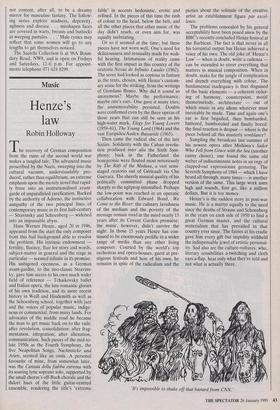Music
Henze's law
Robin Holloway
The recovery of German composition from the ruins of the second world war makes a tangled tale. The advanced music proscribed by the Nazis, sweeping into the cultural vacuum, understandably pro- duced, rather than equilibrium, an extreme emphasis upon the merely novel that rapid- ly froze into an institutionalised avant- garde of unparalleled rarefication. Backed by the authority of Adorno, the instinctive antipathy of the two principal lines of contemporary music in its first half-century — Stravinsky and Schoenberg — widened into an impassable abyss.
Hans Werner Henze, aged 20 in 1946, appeared from the start the only composer from this bad background able to resolve the problem. His intrinsic endowment fertility, fluency, flair for story and words, subject-matter in general and the stage in particular — seemed infinite in its promise. His unbigoted openness, as a German avant-gardist, to the neo-classic Stravins- ky, gave him access to his own much wider field of reference — Tchaikovsky ballet and Italian opera, the late-romantic glories of his own tradition, and its more recent history in Weill and Hindemith as well as the Schoenberg school, together with jazz and the voices of popular music, indige- nous or commercial, from many lands. For advocates of the middle road he became the man to get music back on to the rails: after revolution, consolidation; after frag- mentation, integration; after alienation, communication. Such pieces of the mid-to- late 1950s as the Fourth Symphony, the five Neapolitan Songs, Nachtstiicke and Arien, seemed like an oasis. A personal favourite of mine, from somewhat later, was the Cantata della fiabba estrema with its soaring lyric soprano solo, supported by the small chorus's off-Bach chorale and the dulcet hues of the little guitar-centred ensemble, rendering the title's 'extreme fable' in accents hedonistic, erotic and refined. In the pieces of this time the rush of colour to the head, below the belt, and all the other places that other music of the day didn't reach, or even aim for, was equally inebriating.
Or so it seemed at the time; but these pieces have not worn well. One's need for deliciousness and sensuality made for wish- ful hearing. Intimations of reality came with the first impact in this country of the oratoria Novae de Infinito Laudes (1962). The score had looked as copious in fantasy as the texts, chosen, with Henze's custom- ary sense for the striking, from the writings of Giordano Bruno. Why did it sound so anonymous? Maybe the performance, maybe one's ears. One gave it many tries; the unmemorability persisted. Doubts were confirmed even by the three operas of those years that can still be seen as his high-water mark, Elegy for Young Lovers (1959-61), The Young Lord (1964) and the vast Euripides/Auden Bassarids (1965).
Then came the radical chic of the late Sixties. Solidarity with the Cuban revolu- tion produced inter alia the Sixth Sym- phony; back in the Fatherland the bourgeoisie were flouted most notoriously by The Raft of the Medusa, a vast semi- staged oratorio out of Gericault via Che Guevara. The sheerly musical quality of his politically committed phase dropped sharply as the agitprop intensified. Perhaps the low-point was reached in an operatic collaboration with Edward Bond, We Come to the River: the culinary lavishness of the medium and the poverty of the message remain vivid in the mind nearly 15 years after its Covent Garden premiere; the music, however, didn't survive the night. In those 15 years Henze has con- tinued to be enormously prolific in a wider range of media than any other living composer. Courted by the world's top orchestras and opera-houses, guest at pre- stigious festivals and host of his own, he remains in spite of the radicalism and the pieties about the solitude of the creative artist an establishment figure par excel- lence.
The problems concealed by his general acceptability have been posed anew by the BBC's recently concluded Henze festival at the Barbican. The fact is that never in all his torrential output has Henze achieved a voice of his own. The old joke of Ilenze's Law' — when in doubt, write a cadenza can be extended to cover everything that matters in musical composition. When in doubt, make for the jungle of complication and drench everything with colour. The fundamental inadequacy is thus disguised of the basic elements — a coherent order- ing of harmony, counterpoint, motif/ theme/melody, architecture — out of which music in any idiom whatever must inevitably be made. Time and again one's ear is first beguiled, then bombarded, battered, bamboozled and finally bored: the final reaction is despair — where is the piece behind all this masterly semblance?
Sampling the broadcast last summer of his newest opera after Mishima's Sailor Who Fell from Grace with the Sea (another canny choice), one found the same old welter of indiscriminate notes in an orgy of clapped-out expressionist gesturing. The Seventh Symphony of 1984 — which I have heard all through, many times — is another version of the same. This large work aims high and sounds, first go, like a million dollars. But it is toy money.
Henze's is the saddest story in post-war music. He is a martyr equally to the need since the deaths of Strauss and Schoenberg in the years on each side of 1950 to find a great German master, and the cultural materialism that has prevailed in that country ever since. The fairies at his cradle gave him every gift but impishly withheld the indispensable jewel of artistic personal- ity. Sad also are the culture-vultures, who, literary sensibilities a-twitching and cloth ears a-flap, hear only what they're told and not what is actually there.
Its impossible to shake off that bastard from CNN.'


























































 Previous page
Previous page